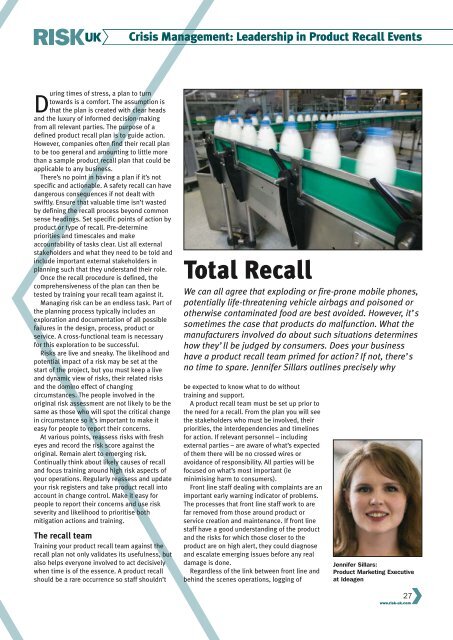RiskUKSeptember2017
Create successful ePaper yourself
Turn your PDF publications into a flip-book with our unique Google optimized e-Paper software.
Crisis Management: Leadership in Product Recall Events<br />
During times of stress, a plan to turn<br />
towards is a comfort. The assumption is<br />
that the plan is created with clear heads<br />
and the luxury of informed decision-making<br />
from all relevant parties. The purpose of a<br />
defined product recall plan is to guide action.<br />
However, companies often find their recall plan<br />
to be too general and amounting to little more<br />
than a sample product recall plan that could be<br />
applicable to any business.<br />
There’s no point in having a plan if it’s not<br />
specific and actionable. A safety recall can have<br />
dangerous consequences if not dealt with<br />
swiftly. Ensure that valuable time isn’t wasted<br />
by defining the recall process beyond common<br />
sense headings. Set specific points of action by<br />
product or type of recall. Pre-determine<br />
priorities and timescales and make<br />
accountability of tasks clear. List all external<br />
stakeholders and what they need to be told and<br />
include important external stakeholders in<br />
planning such that they understand their role.<br />
Once the recall procedure is defined, the<br />
comprehensiveness of the plan can then be<br />
tested by training your recall team against it.<br />
Managing risk can be an endless task. Part of<br />
the planning process typically includes an<br />
exploration and documentation of all possible<br />
failures in the design, process, product or<br />
service. A cross-functional team is necessary<br />
for this exploration to be successful.<br />
Risks are live and sneaky. The likelihood and<br />
potential impact of a risk may be set at the<br />
start of the project, but you must keep a live<br />
and dynamic view of risks, their related risks<br />
and the domino effect of changing<br />
circumstances. The people involved in the<br />
original risk assessment are not likely to be the<br />
same as those who will spot the critical change<br />
in circumstance so it’s important to make it<br />
easy for people to report their concerns.<br />
At various points, reassess risks with fresh<br />
eyes and record the risk score against the<br />
original. Remain alert to emerging risk.<br />
Continually think about likely causes of recall<br />
and focus training around high risk aspects of<br />
your operations. Regularly reassess and update<br />
your risk registers and take product recall into<br />
account in change control. Make it easy for<br />
people to report their concerns and use risk<br />
severity and likelihood to prioritise both<br />
mitigation actions and training.<br />
The recall team<br />
Training your product recall team against the<br />
recall plan not only validates its usefulness, but<br />
also helps everyone involved to act decisively<br />
when time is of the essence. A product recall<br />
should be a rare occurrence so staff shouldn’t<br />
Total Recall<br />
We can all agree that exploding or fire-prone mobile phones,<br />
potentially life-threatening vehicle airbags and poisoned or<br />
otherwise contaminated food are best avoided. However, it’s<br />
sometimes the case that products do malfunction. What the<br />
manufacturers involved do about such situations determines<br />
how they’ll be judged by consumers. Does your business<br />
have a product recall team primed for action? If not, there’s<br />
no time to spare. Jennifer Sillars outlines precisely why<br />
be expected to know what to do without<br />
training and support.<br />
A product recall team must be set up prior to<br />
the need for a recall. From the plan you will see<br />
the stakeholders who must be involved, their<br />
priorities, the interdependencies and timelines<br />
for action. If relevant personnel – including<br />
external parties – are aware of what’s expected<br />
of them there will be no crossed wires or<br />
avoidance of responsibility. All parties will be<br />
focused on what’s most important (ie<br />
minimising harm to consumers).<br />
Front line staff dealing with complaints are an<br />
important early warning indicator of problems.<br />
The processes that front line staff work to are<br />
far removed from those around product or<br />
service creation and maintenance. If front line<br />
staff have a good understanding of the product<br />
and the risks for which those closer to the<br />
product are on high alert, they could diagnose<br />
and escalate emerging issues before any real<br />
damage is done.<br />
Regardless of the link between front line and<br />
behind the scenes operations, logging of<br />
Jennifer Sillars:<br />
Product Marketing Executive<br />
at Ideagen<br />
27<br />
www.risk-uk.com

















